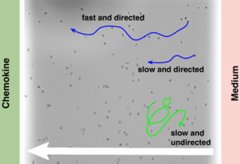2018-08-07
How tumstatin influences immune cells in experimental asthma

Neutrophil granulocytes move in the direction of high chemokine concentrations (to the left). A tumstatin fragment decelerates and inhibits the directed movement of neutrophils (yellow arrow) in comparison to a non-effective test substance (blue arrows). (Image [modified] from Nissen et al., Copyright: John Wiley & Sons Inc.)
ARCN scientists published results on the effect of the protein tumstatin in experimental asthma. The findings might open up a new avenue for treatment.
Tumstatin is a small protein that is cleaved off from collagen IV molecules in the human body. It suppresses angiogenesis and inhibits tumor growth. Previous studies showed that tumstatin levels are reduced in the lung tissue of asthma patients. In an experimental animal model of asthma tumstatin ameliorated airway hyperresponsiveness, inflammation and mucus production.
Based on these findings a team around Dr. Markus Weckmann (University Medical Center Schleswig-Holstein and Lübeck University) asked the question, how tumstatin acts in the asthmatic lung. The scientists were especially interested in the influence of a small tumstatin fragment on neutrophil granulocytes. Neutrophils are specialized immune cells that are important for the defense against pathogens. A high number of these cells were found in lungs of difficult to treat asthma patients where they aggravate the chronic inflammation of the airways.
The authors made three basic findings: First, the tumstatin fragment halved the amount of reactive oxygen species (ROS) in neutrophils. Usually, immune cells use ROS in order to destroy pathogens. In the case of chronic asthma, too much ROS contributes to tissue damage. Second, the tumstatin fragment inhibits the migration of neutrophils to the site of inflammation; also the speed of migration is reduced (see image). Third, in an experimental mouse model, less neutrophils passaged to the airways. Moreover, inflammation was reduced after treatment with tumstatin. This third finding is maybe caused by the first two findings.
Leading scientist Markus Weckmann from the section for Pediatric Pneumology and Allergology of the Lübeck University is confident that the results are promising: „Our tumstatin fragment has the potential to suppress the neutrophilic inflammation in asthmatics. Maybe it also ameliorates the tissue damage we often see in patients.” Further experiments on the tissue damage due to asthma have already been started in cooperation with DZL’s All-Age-Asthma-Kohorte des DZL (ALLIANCE) and industrial partners.
Scientists of the University Medical Center Schleswig-Holstein and Lübeck University ran this study together with colleagues of Research Center Borstel and further German, Dutch and Australian partners. The results have been published in the journal Clinical & Experimental Allergy.
Further information: Nissen G, Hollaender H, Tang FSM, Wegmann M, Lunding L, Vock C, Bachmann A, Lemmel S, Bartels R, Oliver BG, Burgess JK, Becker T, Kopp MV, Weckmann M (2018) Tumstatin fragment selectively inhibits neutrophil infiltration in experimental asthma exacerbation. Clin Exp Allergy [Electronic publication Jul 22, 2018]
/jbul
Calendar
Upcoming events
2024-04-30
Virtual DZL AID Kick-off Seminar
2024-05-29
74th Meeting of ARCN
2024-06-05
